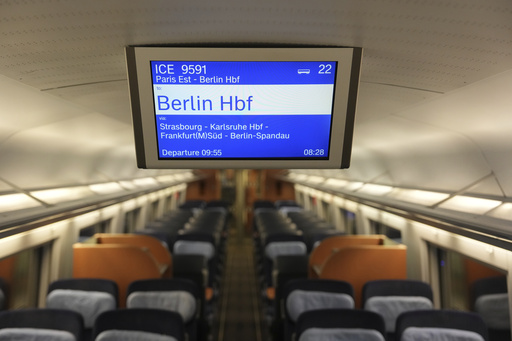
BERLIN — On Monday, Germany and France officially unveiled a high-speed train route connecting Berlin to Paris, which is being celebrated as a symbol of the strong ties between the two nations and a potential boost for train travel across Europe.
Even though the service is a welcome convenience, it may not significantly alter travel times for passengers. The train, operated by German company Deutsche Bahn, runs once daily and takes around eight hours, providing a slight enhancement in comfort compared to existing indirect options available.
In an effort to improve its frequently criticized punctuality, Deutsche Bahn is working hard to improve its track record. Recent statistics revealed that only 60% of long-distance trains adhered to their schedules, which is defined as arriving within six minutes of their expected time. The company has committed to enhancing punctuality, aiming for over 75% by 2027 through various initiatives.
As part of its strategy, Deutsche Bahn has initiated updates on many rail sections. This includes the reopening of a vital 70-kilometer (45-mile) segment between Frankfurt and Mannheim, which had been shut down for five months due to extensive renovations. The German government has pointed out that inadequate investment over the years has led to the current challenges facing the railway system.
The new Berlin-Paris service makes several stops along the way, including Frankfurt, Karlsruhe, and Strasbourg, which also hosts a European Parliament location. The westbound train arrives in Paris shortly before 8 p.m., while the return train leaves Berlin at a little past 6 p.m. In addition to this new route, there is a slower overnight train traveling three times a week, previously introduced by Austrian operator ÖBB, which has been pivotal in reinvigorating night travel in Europe after many rail companies had significantly reduced or eliminated these services. Notably, Deutsche Bahn had ceased its sleeper service on this route a decade ago.
This launch is part of the annual revamp of European train schedules that occurs each mid-December, which this year also includes a new high-speed connection between Munich and Amsterdam, reducing travel time to just seven hours.
The relationship between Germany and France continues to be a cornerstone of the European Union, with these nations being its largest and most populous members. According to Berlin Mayor Kai Wegner, this new rail link symbolizes the enduring friendship between the two countries. German Transport Minister Volker Wissing echoed this sentiment, asserting that the connection is much more than an added service. He emphasized that there remains significant potential to encourage greater rail travel in Europe by crafting attractive offers, thus strengthening the bond between the two nations.

